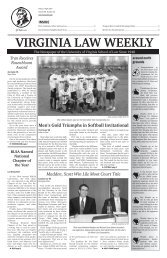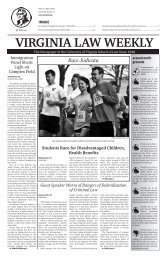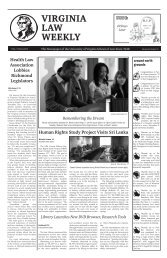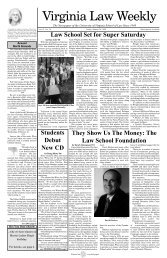Create successful ePaper yourself
Turn your PDF publications into a flip-book with our unique Google optimized e-Paper software.
News & Features2 <strong>Virginia</strong> <strong>Law</strong> <strong>Weekly</strong> Friday, <strong>September</strong> <strong>26</strong>, <strong>2003</strong>Diversity PanelOpens Up StudentDialogueTwenty-five students and facultymembers gathered onWednesday to take part in thepanel, “<strong>Law</strong> School Diversity: TheStudents’ Perspective,” sponsoredby the SBA Diversity Committee.The panel was composed entirelyof students and included DaveGlazier, Davis Kim, DJ Moore,Lillian Omand, Paula Ro, andJames Whitehead. Each panelistdiscussed his or her involvementwith student organizations at the<strong>Law</strong> School before answering audiencequestions.The spirited discussion questionedhow successful studentorganizations have been at conveyingtheir message to the entirestudent body. Some suggestedincreased SBA involvement infuture diversity events, as well asincreased co-sponsorship amongvarious student organizations.Further, audience members debatedthe characterization of studentorganizations as self-segregating.Views on this issue includedadvocating a more colorblindapproach to diversity, aswell as creating a more comfortableenvironment for the discussionof minority issues.SBA Diversity CommitteeChair Andrew Woodworth concluded,“Though none of the issuesraised can be resolved duringan hour long panel, the exchangeof ideas and input fromthe students that attended thepanel was very encouraging.Hopefully, it will lead to strongerinvolvement by the whole studentbody and more effective panelsand speakers discussing diversityissues.”<strong>Virginia</strong> <strong>Law</strong> <strong>Weekly</strong>Christopher ColbyExecutive EditorBrian GreenIllustratorMike SpitzerManaging EditorVictor KaoProduction EditorGretchen AgeeDrew Larsen News Editor Lorre LutherColumns EditorFeatures EditorClaudia Sue Gee VassarReviews EditorSam YoungPhoto Editor & DICTA EditorScott PlutaTreasurerAssociate EditorsTom O’GradyAssociate Columns EditorNick BenjaminAssociate Reviews EditorScott MeachamEditor-in-ChiefHEPBURNcontinued from page 1— What is your religion — haveyou ever been a communist —What is your income — Whomdo you support — How much didyour house cost — the furnishings— your wife’s clothes — herjewels — fur coats — how muchdo you spend on your children’sschools — Travel — Entertaining— Books — Liquor — Flowers— Teeth — Do you wearglasses — Do you still menstruate— Are your periods regular— your bowels — What operationshave you had — do yousleep in the room with your wife— and how long has that beengoing on — Have you ever beeninvolved with the law — do youdrink — Let’s just have a fingerprintnow — How much — Theseare among the questions whichmust be answered — if — youare insured by your employer —(an actor is) — drive a car — payan income tax — get social security— etc. —The greatest “bugaboo”against privacy — and the ideaof privacy in this country is insurance— You can be protectedagainst anything, but for it youmust sacrifice your privacy — Ifa friend is injured in your house— let the company pay — If youcan’t save enough money to liveon in your old age — if you are ill— if you are hospitalized — if anactor is ill — Now all this isprogress — these things are necessary— They are things whichan individual can no longer beresponsible for — The Governmentor the Company must stepin and bear the burden — butwith the loss of responsibility —we also have lost our privacy —Privacy in the sense that it wasused thirty years ago has almostceased to exist — the individualhas become a pretty wellEditorial PolicyLaurie RipperAssociate News EditorPaula Ro & A.J. StephensAssociate Production EditorsAlison HaddockAssociate Features EditorCOLUMNISTS: Kristianna Brugger, Oreste McClung, SBA NOTEBOOK.CONTRIBUTORS: Katherine Hepburn, Thaddeus Lorenzo, Maggie Samra, and Sean Suder.REVIEWERS: Morgan Evans, Lee Kovarsky, Brent Olson, and George Pence.Published weekly on Friday except during holiday and examination periods and serving the <strong>Law</strong> School communityat the University of <strong>Virginia</strong>, the <strong>Virginia</strong> <strong>Law</strong> <strong>Weekly</strong> (ISSN 0042-661X) is not an official publication of theUniversity and does not necessarily express the views of the University.Any article appearing herein may be reproduced provided that credit is given to both the <strong>Virginia</strong> <strong>Law</strong> <strong>Weekly</strong>and the author of the article. Advanced written permission of the <strong>Virginia</strong> <strong>Law</strong> <strong>Weekly</strong> is also required for reproductionof any cartoon or illustration.Entered as second class matter at the Post Office at Charlottesville, <strong>Virginia</strong>. One year subscriptions are availablefor $25.00. Subscriptions are automatically renewed unless cancelled. Address all business communications to theManaging Editor. Subscribers are requested to inform the Managing Editor of change of address at least three weeksin advance to ensure prompt delivery.Mailing Address: <strong>Virginia</strong> <strong>Law</strong> <strong>Weekly</strong>, 580 Massie Rd., University of <strong>Virginia</strong> School of <strong>Law</strong>,Charlottesville, <strong>Virginia</strong> 22903-1789Phone: (434) 924-3070 Fax: (434) 924-7536E-mail Address: va-law-weekly@virginia.edu Website: http://www.student.virginia.edu/~law-wkly/Printed on recycled paper by the <strong>Virginia</strong> <strong>Law</strong> <strong>Weekly</strong> and the University of <strong>Virginia</strong> Printing Office.© <strong>2003</strong>-2004 <strong>Virginia</strong> <strong>Law</strong> <strong>Weekly</strong>The <strong>Virginia</strong> <strong>Law</strong> <strong>Weekly</strong> publishes letters and columns of interest to the <strong>Law</strong> School and thelegal community at large. Views expressed in such submissions are those of the author(s) and notnecessarily those of the <strong>Law</strong> <strong>Weekly</strong> or the Editorial Board. Letters from organizations must bearthe name, signature, and title of the person authorizing the submission. All letters and columnsmust either be submitted in hardcopy bearing a handwritten signature along with a disk containingthe file, or be mailed from the author’s email account. Submissions must be received by 5 p.m. theMonday before publication and must be in accordance with the submission guidelines posted on thedoor to the <strong>Law</strong> <strong>Weekly</strong> office in Rooms SL277 & SL279. Letters over 500 words and columns over700 words may not be accepted. The Editorial Board reserves the right to edit all submissions forlength, grammar, and clarity. Although every effort is made to publish all materials meeting ourguidelines, we regret that not all submissions received can be published.documented punch card —“There can be no privacy in thatwhich is already public” —Now let us take a public figure— an actor — We are worseoff than the politician — thepolitician is selling his brain —supposedly — whereas — theactor is selling his body — and/or his own peculiar personalityand this does not command highesteem — There is always a“Well what can you expect” backof derogatory comment — Bothpublic and press feel that theyhave an absolute right of accessto the most intimate details ofyour life — and by life you mustread largely sex life — for this isthe department of an actor’s lifewhich is most titillating to pressand public —At the appropriate age for thissort of thing — I used to gothrough the most elaborateschemes to avoid the press — Ifelt that nothing of my privatelife was any of their business —By the same token I did not feelthat I could then appear in apublic place — or in their territoryso to speak — railroad stations— airports — restaurants— bars — theaters — games —These places were their territory— My territory was my ownhome — a friend’s house — aprivate club — This is all verywell — but then you have thepublic place on a private matter— the hospital — the church —the cemetery — where a publiccharacter is forced by illness ordeath to use a public facility —It would seem that in such acase he or she should have aright to be protected from thepeering eye of the outsider — acourtroom — But even here —or should I say especially here— the taste for the public hasby Alison Haddock ’05It‘s time to set the recordstraight. You have probably heardrumors about them. Perhaps, asa woman, you have felt threatenedby them. Maybe you feltthey symbolized an act of desperation.But after talking to some<strong>Law</strong> School males — and females— I was forced to alter my opinion.Although an exclusive andsomewhat secretive endeavor,the mixers <strong>Law</strong> School maleshave organized with undergraduatesororities seem to haveseveral innocent-minded purposes:to meet women outside ofthe <strong>Law</strong> School, to meet newpeople in general, and just tohang out in a casual settingwith friends.To catch the first-years up tospeed, during the second semesterof last year, a small butdedicated group of first-yearmen decided to organize eventswith different sororities on campus.Organizer Steve Kaplan’05 provides a well-consideredrationale for targetingting theseundergraduate organizations.He notes that “Boys like girls,boys like meeting girls that theydon’t already know, so they canfind out if they like them or not.Sororities are conveniently organizedto make meeting [girls] easy,so we take advantage of that.”Kaplan and others planned threeor four mixers last year, have hadone this semester, and have morein the making. The events haveranged from bar hops to houseparties to intimate cookouts andcombine the traditional party elementsof people, alcohol, and idlechatter. Interest in these eventsdoes seem to be dual-sided — ason some occasions <strong>Law</strong> Schoolorganizers have contacted sororities,and sometimes the sororitiesthemselves make the contact.been geared to a diet of suchextravagance — that the magazinesand press — so called respectableones — must continueto feed it — cater to it — in themanner to which they have accustomedto it — Polite pornographyis no longer interesting —No more subterfuge — The nakedfact — Tell it — Do it —There it is — That is the fact —The truth — The four letter word— The naked body — Nothingwithheld — You feel sad — low— take a benzedrine — You feeltoo lively — take a sparine —you want some sleep — take asecanol — you feel pain — takesome codeine — you are confused— go to a psychoanalyst —Don’t hide it — Talk — tell it —It is never your fault — We’ll fixthe blame — Mama — Papa —Uncle Sam — Teacher — Employer— They are responsible— I would seem to wander —but if you have a public fed onthese intimate details — if youhave a public geared to listen —read — speak — about the mostintimate details of another’s life(to say nothing of their own) andgeared to “understand” any vagary— because nothing is eitherright of wrong — and gearedto the divine right of life — to joy— to freedom — Run — Jump —Go — Go — Go — Happy —Happy — Happy —Well — how hard should youtry — Give us the responsibility— We are responsible — don’tworry about anything — This isa tough atmosphere in which toestablish the fact of privacy —let alone the right — Keep out ofmy life — I will be responsible —I have a right to be let alone — Itis not a part of our lives anymore— Too many people — andpeople who have been too poorSorority Girls are Easygraphic by Scott Meacham“Good, clean, wholesome fun.”The majority of <strong>Law</strong> Schoolattendees at these events are currentsecond-years, perhaps becausethe organizing force behindthe events came from this class.The people whom the organizersinvite are not necessarily a selectfew, but rather just the membersof an e-mail list of people whoexpressed interested in such mixers.For the first party of thisyear, even some first-years wereinvited. Kaplan further explains,“We try to limit the party to thefirst 50 people to R.S.V.P., as away of keeping the party the rightsize and so we can buy the rightamount of drinks.” Traditionally,organizers have collected ten dollarsfrom each attendee to coverthe costs of the event.Some participants in theseevents seem to stress their fraternalaspects. One source who preferredto remain anonymousnoted, “I went in part becausesome of my friends were going,but also [because of] the opportunityto meet other folks outside ofthe <strong>Law</strong> School. It’s a tad insularto be very interested in privacyanyway —Bobby Kennedy wants toclimb his brother’s CanadianMountain — be the first to get tothe top — leave a token there —This was the warm and thrillingand mysterious — until he soldit or gave it to Life Magazine —and the television went along —The act had to lose a lot of itsmeaning to him by being publicized— or at least it would haveto me — Who am of anothergeneration — I pick him — becausehe is a fellow whom Igreatly admire — behaving inthe manner of today —Their bosoms — their secrets— their loves — their sex theories— their sins — thrills weretitillating when you only got apeek — But now in magazinesyou’re not even ashamed to buy— Down in black and white —THE TRUTH — in words andpictures — Stolen or sold — acuriously literal world — Themagic — the ephemeral — whatcan’t be caught in this black andwhite arrangement — Maybethat’s the privacy — Maybe it’sinside your own head — yourimagination — which cannotlend itself to words — Our ownindividual “touch of the poet” —Everything has to be consideredin relation to the world weare living in — I do not knowhow you can relate privacy tothis world — they would seem tocontradict each other —About DICTA: Faculty areencouraged to submit articleson privacy or other legal topics.Contact DICTA Editor SamYoung at syoung@virginia.edu.here, so anything to branch out isnice.” One can imagine a moreOld School-type element to thesegatherings this gentleman barelyhints at. It is this, perhaps, thatsome women fear.Many women seem to believethat there seems something innatelywrong with 27- or 28-yearoldguys hitting on undergraduategirls. But many also seem tounderstand their classmates’rationale. One second-yearwoman noted that “the <strong>Law</strong>School is too small, it is likedating someone in high school”and therefore it makes sense tolook for romance elsewhere.Another female clarifies, “Ofcourse [<strong>Law</strong> School guys] aredoing it just to meet people, butthey are looking for girls to dateand hook up with. For a lot ofguys that is one and the same,most guys don’t want girls justto hang out with. They look at<strong>Law</strong> School girls as their friends,they don’t want to date us.”Male classmates agree with thisoutside assessment. Dave Thomas’05 says, “The difference is,<strong>Law</strong> School events people go towith the intent to have fun, mixerspeople go to find people they candate.”Lest anyone worry that Kaplanand his pals are biased againstgraduate and professionalwomen, he notes that althoughevents with medical and businessschool students “are not nearly aseasy to organize as those schoolsare not divided up into pre-dividedmixing groups,” he and hismedical school roommate areplanning a law/medical schoolparty for early October. To womenat the <strong>Law</strong> School, Kaplan laments,“It is unfortunate thereare not comparable, pre-organizedgroups of men that are of interestto the girls of <strong>Law</strong> School.”











